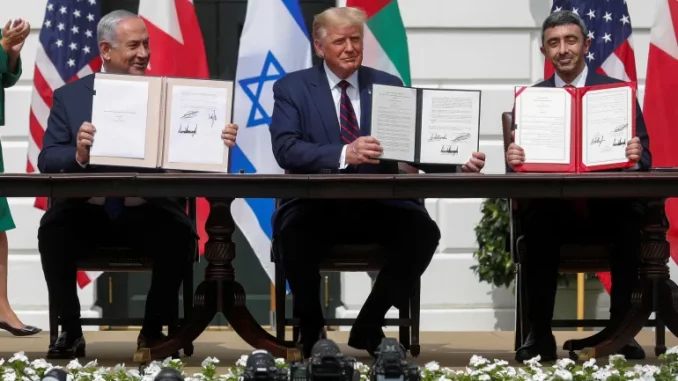
Israel’s Prime Minister Benjamin Netanyahu, US President Donald Trump and United Arab Emirates Foreign Minister Abdullah bin Zayed Al Nahyan display their copies of signed agreements during a ceremony at the White House, September 15, 2020 [File: Tom Brenner/Reuters]
| Published August 11, 2025
U.S. President Donald Trump is urging all Middle Eastern nations to formally join the Abraham Accords, the U.S.-brokered agreements that normalized ties between Israel and several Arab states. His renewed push comes after his claim that Iran’s nuclear arsenal has been “totally obliterated,” framing the moment as a rare opportunity to secure “PEACE IN THE MIDDLE EAST.”
Trump made the statement on August 7, 2025, through Truth Social, underscoring that broad participation in the accords is a “very important” step toward long-term regional stability. The original accords, signed in 2020 under his administration, brought Israel into open diplomatic relations with the United Arab Emirates, Bahrain, Morocco, and Sudan—an unprecedented shift in regional politics.
Regional Context & Challenges
Trump’s call comes amid volatile circumstances. The ongoing Gaza conflict and growing public anger in Arab nations over Palestinian suffering make new normalization deals politically difficult. Some regional powers, including Saudi Arabia, have slowed or suspended talks on recognition of Israel, citing the humanitarian crisis and domestic pressure.
While smaller Gulf states and certain North African countries may consider the move, others—such as Lebanon, Syria, and Iraq—remain deeply opposed. Meanwhile, Tehran’s regional influence, fueled by proxy groups and alliances with Russia and China, continues to shape the security landscape.
Strategic Implications
If more countries join, the accords could significantly shift the Middle East’s diplomatic map—enhancing economic cooperation, bolstering security alliances, and potentially reducing reliance on U.S. military presence. However, critics warn that pursuing normalization without addressing Palestinian statehood risks deepening divisions, fueling unrest, and undermining the accords’ legitimacy among Arab populations.
Trump’s framing of Iran’s “obliterated” nuclear capability remains unverified by independent sources, but it serves as a political rallying point for his broader foreign policy agenda, positioning him once again as a deal-maker in the region.
 Implications
Implications
Here are the key implications of Trump’s renewed push for all Middle Eastern countries to join the Abraham Accords:
1. Diplomatic Realignment in the Middle East
-
If successful, this would represent one of the largest shifts in Middle East politics in decades—formalizing Israel’s acceptance across the Arab and Muslim world.
-
Smaller Gulf states and countries with limited direct conflict with Israel (e.g., Oman, Kuwait) might be more easily persuaded than nations with deep-rooted political or public opposition (e.g., Lebanon, Syria).
2. Strained Palestinian Relations
-
The push risks further alienating Palestinian leadership, who already see normalization without a Palestinian state as a betrayal.
-
It may also deepen the divide between Arab governments that join the accords and populations that remain staunchly pro-Palestinian, increasing internal dissent.
3. Iran’s Regional Isolation
-
Trump’s framing of Iran’s “nuclear arsenal obliteration” positions Tehran as diplomatically cornered.
-
More Arab–Israeli ties could weaken Iran’s influence, especially in the Gulf, while pushing Tehran to strengthen alliances with Russia, China, and non-state proxies like Hezbollah and the Houthis.
4. Economic Opportunities
-
New trade, investment, and tourism agreements could emerge, similar to the UAE–Israel boom post-2020 Accords.
-
Defense cooperation could also grow, especially around missile defense and intelligence sharing, as countries seek protection from Iranian or proxy attacks.
5. U.S. Leverage & Election-Year Optics
-
Trump’s message doubles as a foreign policy statement and a political signal for 2025’s U.S. political climate—projecting him as a dealmaker.
-
Success could boost U.S. influence in the region, though failure might expose limits in Washington’s ability to shape Arab–Israeli diplomacy during ongoing Gaza hostilities.
6. Increased Polarization
-
Supporters see this as a pragmatic peace plan leveraging the momentum from Iran’s alleged nuclear setback.
-
Critics see it as bypassing core conflicts, ignoring humanitarian crises, and favoring Israel without securing Palestinian sovereignty.
 Overall Takeaway:
Overall Takeaway:
Trump’s renewed push for full Middle Eastern participation in the Abraham Accords is both ambitious and contentious. While it could mark a historic diplomatic breakthrough, its success depends on resolving core conflicts—particularly the Palestinian question—amid a backdrop of war, distrust, and competing regional interests. Without parallel progress on these issues, the initiative risks being seen as a strategic alignment that overlooks one of the region’s most enduring disputes.
SOURCES: THE JERUSALEM POST – Trump: Important that Middle Eastern countries join Abraham Accords
THE GATEWAY PUNDIT – President Trump Emphasizes Need For Mideast Nations To Enter Abraham Accords
AL JAZEERA – Trump says he wants all Middle Eastern countries to have formal Israel ties
REUTERS – Trump: Important that Middle Eastern countries join Abraham Accords





Be the first to comment